Footprints In Our Path
1500's-1800's
|
In the mid 1500's, there were many hostile feelings in France between the Catholics and French Protestants known as The Huguenots. The Huguenots initiated an upheaval in 1560 by trying to capture the King but the attempt failed and the punishment was heavy. Soon after, while a group of Huguenots was holding its religious services, the Duke's Musketeers fired on the group. Twenty were killed and 100 wounded. Three short wars followed with much murder and killing on both sides. The Catholics sought help from Spain, and The Huguenots from England. On August 23, 1572, Saint Bartholomew was killed and a massacre followed. Over 2000 Huguenots were killed in Paris, 700 in Lyons, 500 at Orleans, 200 at Meaux and several other places. By 1628, the political power of the Huguenots was finally crushed forever. Most of the Huguenots who escaped death fled to Germany, England, Holland, and Switzerland. The city of Geneva welcomed the refugees and they were given immediate assistance. Perhaps nowhere has the reception of religious refugees produced more obvious economic advantages than in Switzerland. Many were skilled craftsmen who helped to develop the textile, lace-making, clock, and watch-making industries. It was from this group of people, the Rossier family emerged. Almost everyone has had the privilege of hearing stories regarding one's heritage. Often told so as a child one could visualize each step those ahead of you trod by one's predecessors, a family story is often passed down through generations to keep particular memories alive. 
In 1655 Pierre Rossier settled in Vevey on the shore of Lake Geneva. He had 10 children. One, Jean Rossier was born in 1652 and he had Jean (John), (1710-1797). He was an Attorney at Les Tavernes and Rougemont, Switzerland. He was married to Madeleine George and died at the age of 87 on March 30, 1797. His son, Daniel Isaac Rossier (1752-1803), was baptized at Chatillens on February 25, 1752. He was married to Marguerite Cordey who died on January 11, 1805, at the age of 44. Daniel died on March 23, 1803 at Les Tavernes at the age of 51. Among those he left behind was a son. John Daniel Rossier was born January 13, 1797, at Les Tavernes and baptized January 27,1797, at Chatillens. He was married to Jeanne-Marie Thonney from Vulliens on August 19, 1825 at Chatillens. The parents later moved to a farm in Les Tavernes and the father died there on November 23, 1843. Four children were born to them: John, Louis, Marie, and Susan. John was born December 12, 1825, at Vulliens and baptized on December 23rd. Louis had a son named Charles and a daughter named Fanny. Charles lived in the Les Tavernes area all of his life. Marie was born about 1830. Her married name was Corde'. She had a daughter named Emma, married name was Monet. Emma had two children: Eugene Monet who settled in Russia around 1890 and a daughter named Jane Monet. Susan was born October 20, 1835 and came to America with her eldest brother, John. She later married Frank Domina who worked as a laborer and part-time minister. They settled on a small farm in Newport, Vermont where they lived most of their lives. They never had any children. Susan died April 29, 1911 at the age of 76. Frank lived alone for about ten years. As he became older, and in poor health, he moved in with Emile and Esther Rossier at Montgomery Center. He died on November 25, 1923 at the age of 83. Frank and Susan are buried in the Newport Center Cemetery. John Daniel RossierJohn Daniel was born with an abnormal leg, which gave him some difficulty in his childhood years but improved as he got older. His parents were determined that he should have a good education as he would be somewhat handicapped to do a lot of physical work. There were times his mother carried him to school, as he was not able to walk the distance. After acquiring an education, John became a teacher in the elementary schools of Vevey, Switzerland. On August 19, 1847, he married another teacher, Jeanne Louise Mayor (born January 1, 1826). She was the daughter of Daniel Mayor and Louise (Woridel) Mayor from Oren-le-Chateau. Growing up she lived in the Chateau d'Oron about 20 miles North of Vevey, Switzerland. It was the home of her father, Daniel Mayor when he was governor of the Canton. 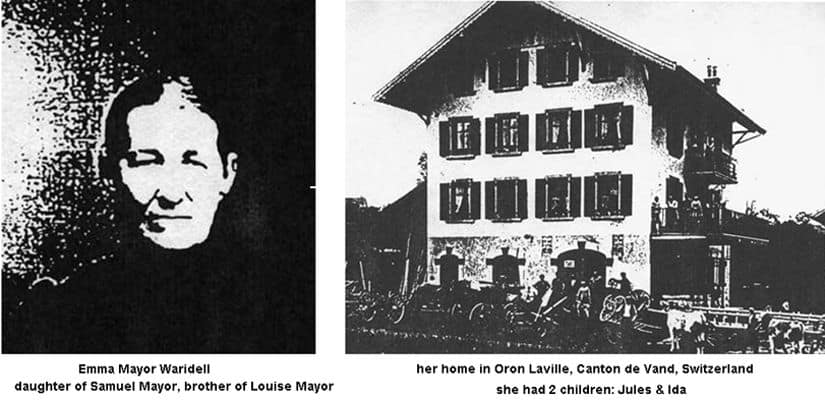 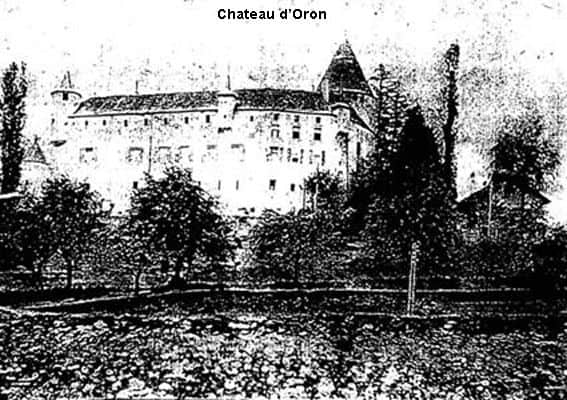
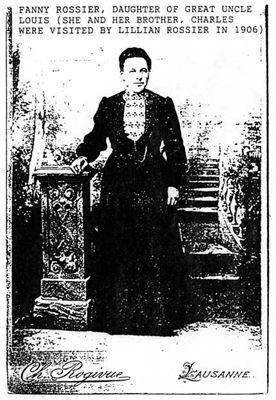
John and Jeanne Louise lived in Vevey. He continued his education at Lousanne College, as well as at Lousanne Missionary Institute and was ordained as a Baptist minister. How strange that a physical handicap that made him unfit to become a laborer led to his lifelong work as teacher and minister. A son, Henry, was born at Vevey on September 21, 1850. Another son, Lewis, was also born at Vevey on April 6, 1852. In the summer of 1853, Louise gave birth to another son, Paul. John became very interested in missionary work and began corresponding with Madame Feller, a friend of the family. She had emigrated to Canada and started a school to teach Indians French and the Christian faith and to convert Roman Catholic French settlers to the Baptist religion. Madame Feller and the Feller InstituteUpon persistent urging from Madame Feller, John decided to undertake a voyage to Canada in the Spring of 1854. With him, he took his wife, (again with child), his youngest sister, Susan, and his three small children: Henry, Lewis, and Paul. He hoped to begin a new life as a missionary. John applied for passports at Vevey to go to St. Pie, Canada on April 11, 1854 and received them on April 13th. The trip across was a long, hard voyage and took much longer than planned. During the voyage the weather and sanitary conditions were very bad. Baby Paul became sick. John and Louise cared for him as best they could but by the time the ship arrived in Canada, it was evident that he might not survive. They reached St. Pie on June 1, 1854. Paul lived only 5 more days. He was buried in St. Pie. Louise gave birth to a daughter that September. She was named Clara. The family stayed in St. Pie a little over a year while John taught school there. In the Fall of 1855, they moved to Grande Ligne to help Madame Feller at the Grande Ligne Mission. Samuel was born to them on December 21st of that year. A church in Montgomery, Vermont made a request to the Grande Ligne Mission to have a station in their town. John accepted this appointment. In 1857, he was called back to manage The Grande Ligne Mission School. Another son, Emile, was born in March of that year. In 1859 Louise became ill and died at the Mission on May 11th and was buried in the Mission cemetery. there but was later moved to Montgomery Center, Vermont. 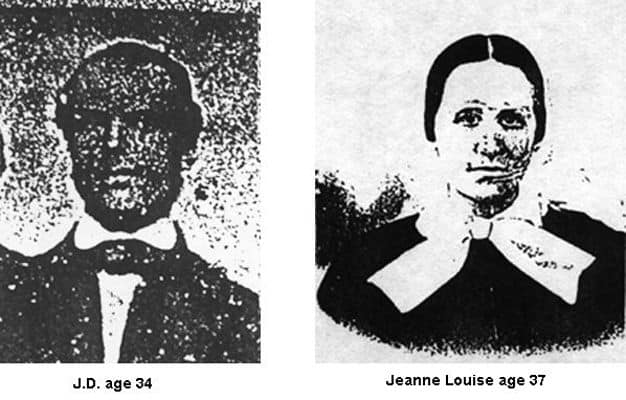
During the latter years of the Civil War, John Daniel took over the parish of the Church of Montgomery and West Enosburg from Reverend Sestourneau who was forced to retire because of ill health. During this period, Catholic priests moved among the French Canadian settlers, exhorting them to renounce their newly adopted religion. John realized his efforts must be directed toward the teaching of a solid foundation of religious principles rather than appealing to people's emotions, which had heretofore somewhat obstructed the intent of the denomination. The priests proposed a public debate be held with John and he was able to successfully defend his position. The church remained firm and united. Later that year, the board of Directors of the Grande Ligne Mission called him back to take direction of the Mission where he stayed about two years Eventually, John returned to Montgomery and later married a Canadian born woman of German descent by the name of Celina Schmidt. 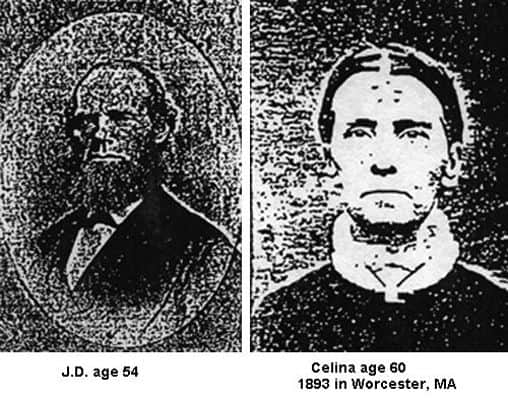
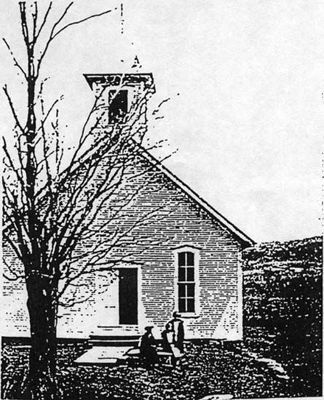
They purchased a farm on West Hill consisting of 80 acres with buildings and another lot of 34 acres. The purchase was made from Moses Rushford on November 2, 1867 for the sum of $1,500. Eight children were born to John & Celina: Gustavus, Ulrich, Alice, Elsie, Harriet, Albert, Eugene, and Ernest. They lived in Montgomery until the end of 1879. By this time, the church had sixty-one members with regular Sunday services in two different localities. Its missionary efforts included services to some seventy French Canadian families. Membership rolls of the church, along with many writings of its activities have been lost. In 1950 the original church on West Hill was sold for $325.00. Today, there are no remains of the church building. In 1880, John Daniel Rossier moved to Union Street in Burlington, Vermont, where he rented a house from Ira Russell for $10.00 a month. Later, he moved to Boston, holding a post as French Missionary for the Tremont Temple Baptist Church. He was pastor of the Ennel Street Baptist Church in Lowell, Massachusetts during 1887 (apparently in 1947 the church merged and 50 years was arbitrarily selected as a celebration event). 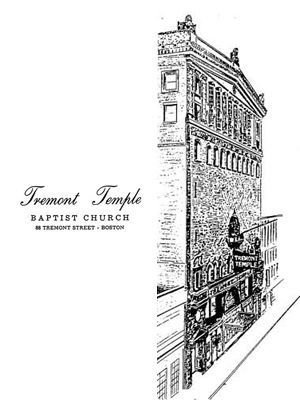
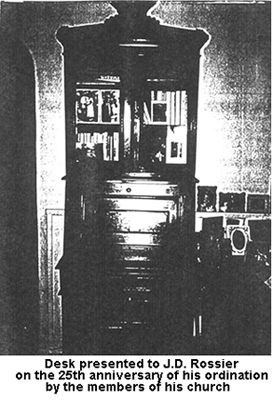
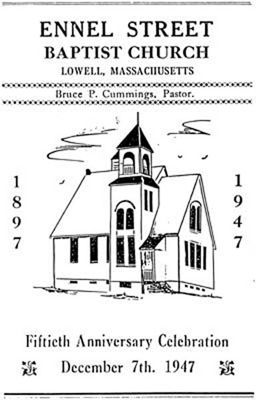
John died in Boston on January 2, 1888. John is buried in Montgomery Center, Vermont. His wife Celina died in Worcester, Massachusetts on January 6, 1895. She was at the home of her daughter, Elsie, who took care of her the last two years of her life. John's first wife, Jeanne Louise, and second wife, Celina are buried in Montgomery Center beside him. Copy of obituary translated from Canadian newspaper January 19,1888Rev. Jean Daniel Rossier died January 2, 1888 at Boston, Massachusetts, at the age of 62. His death ended an honorable career as a missionary evangelist in Canada and the United States. Our brother was born December 12, 1825, in a village near Lausanne Vaud District, Switzerland. Having studied at Lausanne, he became a schoolteacher at Vevey. He received a call from Canada in 1854 and was put in charge of reading at the Grande Ligne Institute. After teaching a few years he devoted himself to evangelization in the French language in the area of Henriville. His yearning and qualities for the ministry were recognized and he was ordained at the Grande Ligne on October 19, 1867, and was installed as a pastor of the French Baptist church in Montgomery, Vermont. His work in this field of 200 Canadian Protestants continued until 1879. It was in October of this same year that he was called to take over the work in French in Burlington, as successor to Rev. A. L. Therrien. Four years later he was put in charge of the French Mission in Worcester, Massachusetts. From there, in 1886, he was called to Lowell to take over teaching at the French Congregational college there. Unable to accept the denominational conditions attached to this position, he resigned after a few weeks and was put in charge of the French ministry. His work was very encouraging, thanks to friends of the gospel in the city who spoke French. From this he entered his eternal rest. Taking part in his funeral service which was at this residence, were Rev. Emory Haynes, Pastor of (?) Temple church, Rev. G. Aubin, successor of brother Rossier in Worcester, Rev. F.X. Smith his brother-in-law from Woonsocket, and M. James Robert of Boston, as well as Pastor Williams. This funeral service, with few formalities, was quite touching with affectionate comments made by friends and colleagues, by the flowers and currency surrounding the coffin, by the presence of parents, friends and fellow-countrymen from Boston, Lowell, Worcester, etc., and especially by the shedding of tears by the large family who preceded the funeral procession for the graveside in' Montgomery, Vermont. A few days before his death, our brother had asked me, as his last request of our long brotherhood, to promise to accompany him to his last resting place and to preside at the funeral service in the midst of his former parishioners and friends of Montgomery, The reception given our friend as he entered his eternal rest was a touching experience from his children who lived in the area and his former American and Canadian friends from his first parish in the United States. Twelve vehicles escorted him from the railroad station in East Berkshire, a distance of seven miles, to the beautiful Baptist Temple in Montgomery. An attendance in excess of 200 people, half American friends and half Canadian Protestants, and a large number of Roman Catholics, were united to honor the memory of one who had devoted himself to Evangelism in their midst. After a funeral service in French and in English, where I was assisted by Pastor Cook of the Baptist Church and Rev. Dr. Evans, Pastor of the Methodist Church, and the last good-byes from this congregation to our brother, several of our fellow countrymen honored him yet with their tears, falling to earth, in a cemetery situated on a high hill, in the land he himself had chosen, the mortal remains of a soldier of Jesus Christ fallen on the battlefield. On this hill surrounded on all sides by the mountain peaks of Vermont, I told myself that awakened on the last day, our brother Rossier in leaving this picturesque land will believe, if he can still think of this land, that he has been sleeping in his native land and that he will awaken in the middle of the Swiss Peaks. The death of our brother Rossier is a great loss to the cause of evangelism in the French language in New England. He inspired confidence. My respect for him in his missionary works can only be expressed in these two words: "Perfectly reliable". We know his nice, poetic talent. I believe that his published, unedited poems would make a nice volume honoring French Protestantism, and would not be lacking for buyers and readers. From our brother's last words I would love to always remember these: "I would love to live and continue working, but I do not fear death. Do not worry about me, The Good Shepherd is with me." J.N. Williams Copy of obituary by M. D. Parent - 1888A "rossier" is a man who leads "rosses" - either weak horses or ill-natured persons. The meaning of this name certainly is not prosaic - but what of it! The name Bourbon comes from the word "mud," some marshland of France. And nonetheless, the great Louis XIV surnamed Roi-Soleil (Sun King) was a Bourbon. In any case, Jean Daniel did not always lead ill-natured persons be they among his students or among members of his congregations. There were many smart, lively, dashing people. He was a man of medium height somewhat stocky, had a bearded chin, was level headed and had the appearance of a distinguished person. His was the character of a gentleman and a poetic soul. He was born in a little village near Laussane in Switzerland in 1825. His parents were not rich, they owned a small plot of land more rocky than good for cultivation. His father sent him to Laussane for his studies to become a teacher. He taught Vevey then came to Canada in 1854. I don't know if he began his work at Grande Ligne but I know that around that time he taught at St. Pie while he stayed some time at my house. He was ordained at Grande Ligne as evangelical minister in October 1867. I have no detail of the ordination. Not long after he was installed as pastor of a Baptist church in Montgomery, Vermont. At that time, it was one of the most prosperous Baptist congregations of the French Canadians (about 200 people). He ministered there until 1879. The school of Grande Ligne was without a director at the death of M. Brouillet. So Jean Daniel was requested to take the direction of this school. He was its director for two years. This part of his life and works is best known to me and would appear to be the most important because I happened to be one of his students. Under his direction there was a glorious religious awakening. It was one of his Sunday sermons that decided me to give my heart to the Lord. Leaving Grande Ligne he returned to the United States where he did missionary work in Worcester and Boston. Mr. Rossier had come to us from Switzerland, a married man. His wife died while he was at Grande Ligne. She was laid to rest in a cemetery where many of our workers were buried. She had given him five children. His second wife was Celina Smith, the sister of O.Y. Smith of whom we have spoken. From this marriage he had many children who are well-known in the United States. One of them, Albert, is pastor of a Baptist Church somewhere in California. In an article that appeared in l'Aurore in January 1888, Dr. J. N. Williams is cited as saying: "A few days before Jean Daniel died, our brother had asked me as a last favor of our long friendship to preside his funeral service in Montgomery among his former parishioners and friends. It was most touching to see the warm welcome of his remains by his children residing in the vicinity as well as by his Canadian and American friends." about ten cars escorted the remains from the railroad station of East Berkshire to the beautiful Baptist church of Montgomery. An audience of over two hundred people, about half of them American friends, some Canadian Protestants and even some Roman Catholics honored the memory of him who had worked in their midst. His poetic talent is well known. The poems he wrote would make a beautiful volume that would render homage to the French Protestantism. Many would eagerly purchase the literary work. The readers of l'Aurore that read M. Williams' article, thirty-eight years ago, will be happy to read over this citation. M.B. Parent 
|